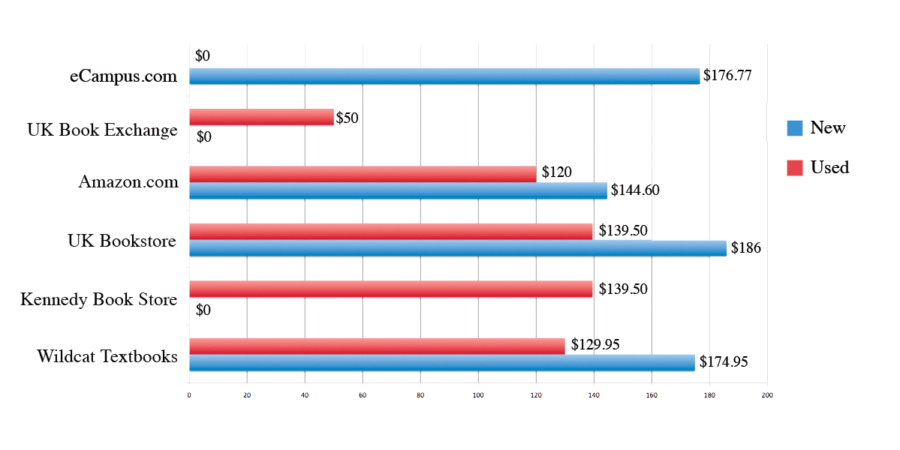High textbook prices lead students to find other options
September 2, 2008
Buying textbooks is something college students do each semester, and for many UK students, the high prices are driving them out of the bookstores and back home to their computers.
Online stores like amazon.com and half.com are a choice for students who are looking to save money on textbooks. Justin Surface, a chemical engineering junior, said he bought most of his textbooks online this semester for about $300. At a bookstore, he estimated he would have spent $580.
Although it might take time to deliver the books, it’s worth it to save money, Surface said.
“It might take a week, but a week of my time is worth more than $300,†he said.
Other students, however, stick with bookstores out of convenience. Emily Parrish, a special education senior, said she only buys textbooks from a bookstore because “it’s easier to just come and pick them up.â€
That is the idea that bookstore owners are hoping for. Carol Behr, general manager of Kennedy Bookstore, said there are many reasons for students to buy from local bookstores.
“With the Internet you can possibly get a cheaper book but it may not be the exact edition required for the class,†she said. “We don’t add in shipping charges and if you need the book in a timely manner we have it here on the shelf.â€
However, students like David Johnson said textbooks at local bookstores are extremely overpriced.
“There is no reason books should cost over $200 for one semester,†he said.
The real reason textbook prices are so high and continue to rise are the publishers, said David Wade, manager of Wildcat Textbooks.
“Our margins don’t change. Prices from publishers go up $8 to $10 every year,†he said. “The same textbook will cost me more next year.â€
Wade said he was considering interior renovations to the store but decided against it just to keep from having to raise book prices any more. Students seem to think profit margins are higher than they actually are in bookstores, Wade said.
“Our markup is never more than 25 percent,†he said. “The margin is a lot smaller than people assume in real life.â€
UK Student Government President Tyler Montell is working toward lower textbook costs by a bill that would eliminate sales tax on certain books.
“Each institution would submit to the state a list of all the textbooks they would be using, and that list would be exempt from the sales tax,†Montell said.
The bill has been pre-filed, and a committee will be doing economic impact research before any action will be taken. If passed, it would not take effect until fall of 2010.
Montell said eliminating the sales tax on textbooks is a small savings for individual students, but could send a big message from state legislators.
“All we’re doing is providing an opportunity for legislators to show their commitment to making higher education affordable,†he said.
Behr said because textbooks are a necessary purchase for college students, they tend to care about the price more than they do on other items.
“People don’t question the margin on beer or shirts but always on books,†she said. “They just have to buy (books), they don’t want to buy them.â€
While publishers set the price for new books, there should be more responsibility put on professors to help students save money, said Behr. When professors decide to use a new edition of a textbook, it prevents the bookstores from being able to buy the book back at a decent price, or sell used copies.
“What we hate and students hate is when a new edition comes out and we can’t buy it back,†Behr said. “Publishers do not like the used book market and try to thwart that with new editions.â€
If professors would only require new editions when necessary, that would save students money because they would be able to buy used, she said.
“Something like biology or physics doesn’t change that often,†Behr said. “Years ago a new edition would come out every five years, but now a two-year-old book is old.â€
Professors also play a part by picking their textbooks early and letting the bookstores know, Behr said. That way the store will pay more for a used copy of the book.
“We can’t pay top dollar if we don’t know if it will be used next semester,†she said.
One way a store can keep books cheaper is by ordering the international version, Wade said. Publishers sell the same textbooks in America that they do overseas, the main difference being that the international version is paperback, making it less expensive, Wade said.
“Most of the time it’s the exact same book,†he said.
Wade said he orders the textbook and international paperback and makes sure they match before selling them.
Certain Internet retailers may currently have some books for cheaper than the bookstores, but Behr said she does not see that lasting too long.
“I see the Internet becoming more and more popular and the prices are leveling out,†she said. “The more people that buy them online, prices won’t stay cheap.â€
Even if prices online stay lower, some students will continue to buy textbooks from local stores, Surface said, simply because they don’t know any better.
“There will always be somebody, mostly freshmen, that are going to give what the bookstores ask for,†he said. “They are unaware that they can get books cheaper.â€
































































































































































